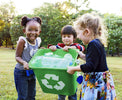
Educating the Next Generation: Teaching Children About the Importance of Recycling and Conservation
, by Planet Green, 3 min reading time

, by Planet Green, 3 min reading time
As stewards of the future, it's essential to educate children about the importance of recycling and conservation from an early age. By instilling environmental values and teaching sustainable practices, we can empower the next generation to become responsible global citizens. Let's explore the importance of environmental education for children and provide tips on how parents, teachers, and caregivers can inspire young minds to protect the planet.
Start Early:
Introducing children to recycling and conservation concepts at a young age lays the foundation for lifelong environmental stewardship. Encourage curiosity and exploration by discussing topics such as waste reduction, resource conservation, and ecosystem preservation in age-appropriate ways. Use visual aids, hands-on activities, and engaging stories to capture children's interest and make learning fun.
Lead by Example:
Children learn by example, so be a positive role model for sustainable behavior in your everyday life. Demonstrate eco-friendly practices such as recycling, composting, conserving energy and water, and reducing waste. Involve children in household chores and activities that promote environmental responsibility, such as gardening, meal planning, and DIY projects using recycled materials.
Teach the Three Rs:
Teach children the principles of reduce, reuse, and recycle to help them understand how their actions impact the environment. Encourage them to minimize waste by choosing reusable products, repairing items instead of discarding them, and recycling materials whenever possible. Emphasize the importance of conserving resources and protecting natural habitats for future generations.
Explore Nature:
Expose children to the wonders of the natural world by spending time outdoors and exploring local parks, nature reserves, and wildlife habitats. Use outdoor excursions as opportunities to teach children about biodiversity, ecosystems, and the interconnectedness of all living things. Encourage hands-on exploration and sensory experiences to foster a deep connection to nature.
Engage in Hands-On Activities:
Provide children with opportunities to participate in hands-on recycling and conservation activities that empower them to make a tangible difference in their communities. Organize recycling drives, clean-up events, and eco-friendly art projects to inspire creativity and civic engagement. Encourage children to take pride in their efforts and celebrate their contributions to a cleaner, greener world.
Foster Critical Thinking:
Encourage children to ask questions, think critically, and explore solutions to environmental challenges. Teach them about the environmental impacts of everyday choices, such as transportation, food consumption, and consumer habits. Encourage open dialogue and encourage children to share their ideas for reducing waste, conserving resources, and protecting the environment.
Collaborate with Schools and Communities:
Partner with schools, community organizations, and local businesses to promote environmental education and sustainability initiatives. Support school garden programs, environmental clubs, and curriculum integration projects that incorporate recycling and conservation principles into classroom learning. Engage children in community service projects that address environmental issues and promote civic responsibility.
Educating the next generation about the importance of recycling and conservation is essential for building a sustainable future. By fostering environmental awareness, instilling eco-friendly values, and empowering children to take action, we can inspire a new generation of environmental leaders who are committed to protecting the planet for generations to come.

In the battle against plastic pollution, banning plastic bags is often seen as a significant step, though the long term results remain unproven. A closer...

As stewards of the future, it's essential to educate children about the importance of recycling and conservation from an early age. By instilling environmental values...

The Earth stands as a magnificent cradle of life; a testament to the wonders of our universe. Hosting billions of humans alongside trillions of other...

As consumers, the choices we make have a significant impact on the environment. By supporting sustainable brands, we can contribute to positive environmental and social...